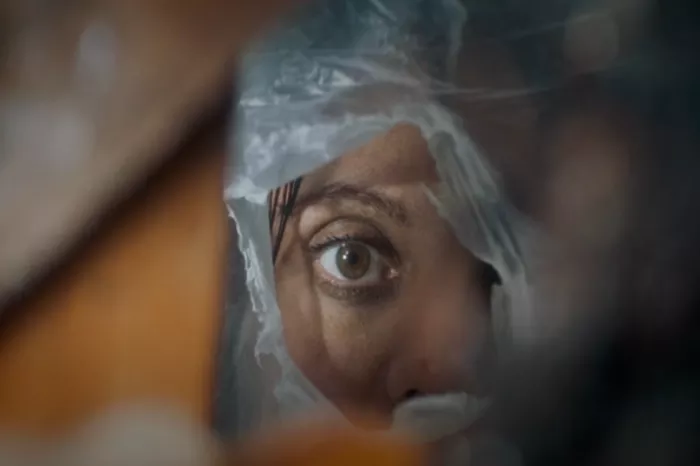In his feature film debut Else, which premiered at the Toronto Film Festival, director Thibault Emin takes audiences on a visually arresting journey through a blend of romance and existential dread. The film’s narrative centers on a budding couple caught in a terrifying and increasingly inescapable threat from the outside world. Emin skillfully transitions from the lighthearted trappings of a romcom to the unsettling realities of isolation and body horror, transforming an apartment setting into both a sanctuary and a prison.
Anchored by the story of Anx (Matthieu Sampeur), a socially awkward man, Else quickly introduces us to his isolated life. His childlike bedroom, filled with colorful toys and bold decor, reflects his inability to form lasting connections with other adults. When he meets Cass (Édith Proust), a brash and carefree woman, their brief one-night stand takes on new significance. The contrast between Anx’s timid nature and Cass’s bold personality sets the stage for an uneasy yet compelling relationship.
At first glance, the film appears to flirt with romantic comedy conventions. A seemingly humorous moment, like Cass tossing a half-eaten fig on the floor to Anx’s horror, hints at the playful dynamic between the two. However, Emin quickly subverts expectations, gradually introducing darker undertones. A social media montage of their party meet-cute the previous night includes a seemingly minor but disturbing detail—a man with unusual welts on his hand. This ominous image signals the start of a far more sinister narrative.
As the plot unfolds, a mysterious illness begins to spread, causing people to fuse with their surroundings—phones, pavement, even rocks. This alarming development forces Anx to barricade himself in his apartment, hoping to avoid contact with the outside world. Cass, however, insists on staying with him, eager to weather the lockdown together. As they attempt to build intimacy in the face of an ever-growing external threat, the tension between romance and survival intensifies.
Emin’s Else takes a sharp turn into horror as the couple faces an unseen menace, absorbing everything in its path. The film’s unsettling atmosphere evokes a sense of claustrophobia and paranoia, with Anx and Cass constantly on edge, trying to fend off what lurks beyond their door. This is when the narrative embraces its sci-fi horror elements, as the couple contemplates whether resistance to this force is even possible.
Cinematographer Léo Lefèvre plays a crucial role in enhancing the film’s shifting tones. His use of color contrasts—ranging from vibrant, home video-like hues during the early romance to stark black-and-white imagery in the later horror scenes—gives Else a visual depth that elevates its narrative. Lefèvre’s ever-confining shots trap Anx and Cass within their apartment, amplifying the sense of isolation and dread. Even when the body horror elements become outlandish, Lefèvre’s artistry keeps the audience visually engaged.
The film’s strength lies in its tactility—Emin’s direction ensures that viewers are constantly aware of the plasticity of the characters’ environment. The melding of objects, surfaces, and even human skin adds a surreal layer to the horror, transforming familiar settings into alien, disorienting spaces. At its core, Else is a meditation on how we view and interact with others, forcing us to confront the fragility of human connection and the boundaries of individuality.
Despite its bold ambitions, Else occasionally struggles with its tonal shifts, moving from playful to somber in rapid succession. The film is both whimsically absurd—such as when a rock monster attacks Cass—and deeply philosophical, culminating in a fable about evolution and lungfish. These jarring transitions may frustrate some viewers, yet they are undeniably intentional, mirroring the chaotic nature of the narrative’s themes.
Ultimately, Else is a daring and strange creation, much like the monstrous entity at the heart of the story. Though it may leave audiences unsettled, Emin’s film is a captivating exploration of intimacy, fear, and the human desire to connect, even when the world around us is falling apart.
Related topic:
Who Is the Director of Titanic Movie?
Was Beverly Hills Chihuahua Successful?

